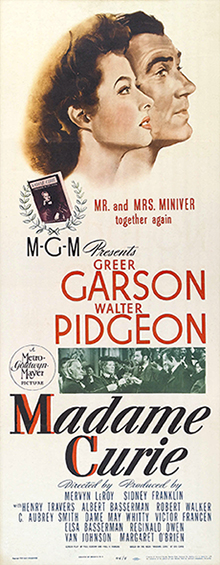(Lisa is currently in the process of cleaning out her DVR! How long is it going to take her? Probably about as long as it took scientists to discover radiation. Still, she’s not giving up! She recorded the 1943 best picture nominee, Madame Curie, off of TCM on February 16th.)
It would appear that if you wanted to produce a best picture nominee in the early 40s, the easiest way to do it was to cast Walter Pidgeon and Greer Garson as husband and wife.
Consider the evidence: In 1941, Blossoms in The Dust was nominated for best picture. Greer Garson and Walter Pidgeon played wife and husband.
In 1942, Mrs. Miniver won best picture. Greer Garson and Walter Pidgeon played husband and wife. Interestingly enough, Garson actually starred in another best picture nominee that year, Random Harvest. Random Harvest is a far better picture than Mrs. Miniver and actually featured a better performance from Garson but it did not include Walter Pidgeon. Make of that what you will.
Then, in 1943, Greer Garson and Walter Pidgeon starred in Madame Curie. Again, they played husband and wife and, again, their film was nominated for best picture.
As you can tell from the poster above, Madame Curie was advertised as being “Mr. and Mrs. Miniver together again.” Actually, Garson and Pidgeon are playing characters far different from the stalwart and very British heroes of their previous film. Instead, they are playing the Curies, Marie and Pierre. The film opens with Pierre meeting Marie at a party and it juggles scenes of their romance with scenes of them discovering and playing with radiation. Of course, it’s a struggle at times. Their colleagues are dismissive of their efforts. Both Pierre and Marie tend to get so caught up in their research that they close themselves off from the outside world. Their efforts pay off when they isolate radium and win the 1903 Nobel Prize. Of course, then Pierre gets run over by a horse while out buying his wife a pair of earrings. Can Marie continue to do their research without him?
The unfortunate thing is that the movie pretty much ends with Marie winning her first Nobel Prize, which means that it leaves out some of the most interesting aspects of her life. For instance, during World War I, she developed mobile X-ray units and worked in field hospitals. She was also active in the struggle for Polish independence, even naming the first element that she ever discover polonium after her native country. She spent almost her entire career working with radioactive material, often carrying radioactive isotopes in her pockets. In 1934, Marie died of radiation poisoning. Her research notes and other papers are so highly radioactive that they’re kept in a lead box and I assume that they probably glow whenever the lid is shut. If you want to study Marie Curie’s notes, you have to put on a radiation suit. Unfortunately, none of this is discussed in the resolutely positive movie.
Judging from what I’ve seen on TCM, Greer Garson appears to have been the Meryl Streep of her day, undeniably talented but a bit too obvious in her technique and just a little boring. The same can be said of Madame Curie, which is a very well-made but not extremely memorable movie. It’s like a lot of the films that were nominated for best picture in the 30s and the 40s — a big, prestige picture that never exactly comes to life. The film is probably at its strongest in the beginning, when Walter Pidgeon does a pretty good job of playing Pierre as a brilliant introvert who is almost too shy to talk to Marie. But, as the film progresses, it just becomes another slow-moving MGM biopic.
What movie beat Madame Curie for Best Picture?
None other than Casablanca.

